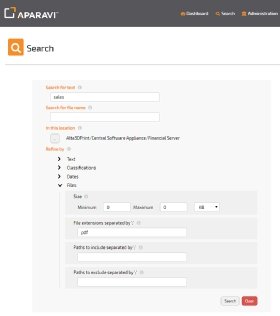
Kit Wai Chan - Fotolia
Aparavi brings archive intelligence to backup
Aparavi's new File Protect & Insight is designed to clean up backup data by combining data protection with the classification and search capabilities of archiving software.
Aparavi is trying to bring the search and data classification features from its archiving software into backup.
Aparavi launched File Protect & Insight (FPI) this week, a file-by-file data protection software product that also includes the robust data classification, tagging and search features found in Aparavi Active Archive. The goal is to bring unstructured data under control while also protecting it.
Aparavi FPI runs on an on-premises appliance, where it creates a file-based snapshot archive. Data stored at end points and servers point at this appliance as their backup target, and then FPI creates the snapshots. The software allows multiple versions of snapshots and can also push data out to the public cloud for more cost-efficient storage. Aparavi is fully integrated with public cloud vendors AWS, Microsoft Azure, IBM Cloud, Google Cloud, Oracle Cloud and Wasabi, and with private cloud vendors Scality, Caringo, Backblaze and Cloudian.
The "Insight" half of FPI comes from the software's ability to scan files and pull metadata as well as information from within the files. This allows data to be organized by words and phrases, creation date, file type and patterns. This also makes the data taggable and searchable. This capability, officially branded Aparavi Data Awareness, is the key feature in the vendor's Active Archive product.
Jonathan Calmes, vice president of business development at Aparavi, said Active Archive customers wanted more use cases around backup because of the continuing threat of ransomware. He said Aparavi's core competency is focused around organizing data, but FPI was designed to be a data protection product first.
"This product uses the same layers of intelligence, but it's focused more on backup rather than archive," Calmes said.
Calmes said Aparavi FPI works alongside traditional data protection products rather than replacing them. Aparavi adds file-by-file intelligence and a content-aware index to the snapshotting capabilities of vendors like Veeam and Zerto. Aparavi FPI costs $400 per terabyte per year.

George Crump, president of analyst firm Storage Switzerland, said Aparavi FPI does a good job shoring up some of the weaknesses in data protection. He said backing up unstructured data is difficult because of the high file counts, and many other vendors do not have the level of granularity that Aparavi offers. It works as a low-cost "second line of defense" with some perks beyond data protection.
"I think it's very smart not to be competitive," Crump said.
Crump said Aparavi FPI could lower the cost of an organization's backup product, especially if it's licensed on a per-capacity-under-protection basis. Being able to comb through backup data for the purposes of compliance or e-discovery could also save organizations from costly mistakes. While the tagging and searching capabilities Aparavi provides can be found in archive-focused products, Crump could only name Igneous Systems as another vendor that combines data protection and archive.
Part of why unstructured data growth becomes difficult to manage is because "Generally, people are horrible at tagging data," Crump said.
There are no guidelines or standards of practice on how businesses should flag files to make them easier to find. Different organizations may come up with their own rules, such as a financial firm making sure to tag everything with personally identifiable information or credit card information, but Crump said in general, expecting employees to manually tag files as they are created is a high bar for most organizations.
Crump said good tagging and search can usually be found in the media and entertainment industry, but only because the cameras that create the files automatically create metadata like time and date stamps, GPS location and the resolution the film was shot at. The humans behind the camera aren't responsible for that.
"Every backup solution is weak in this area," Crump said, adding that the tendency for most IT admins is to dump unmarked, unsearchable backup data into a dark pool. "I think as regulations come in, people will start to see the value of search."







